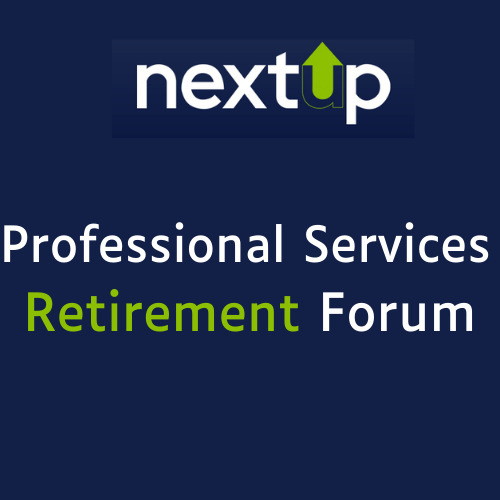Launch of Professional Services Retirement Forum
24 February 2022 By Victoria Tomlinson

In April, Next-Up will hold its first Professional Services Retirement Forum to share the latest thinking around helping partners to retire.
It is clear that retirement as such is outdated. Partners who retire in their 50s and 60s are generally at the peak of their performance, pretty fit and healthy and far too young to spend their lives just playing tennis or travelling.
Once, the natural route for anyone wanting to stay engaged with the world of ‘work’ would have been to become a non-executive director. Some still want this, but many more see it as stressful and risky. Others who might aspire to NED roles may well be disappointed as boards look for diversity in every sense – gender, ethnicity, age, expertise in areas such as cyber and data.
As the world and partners themselves are changing, so firms are trying to work out how they should help partners pre-retirement, if at all. And should they stay in touch after they leave. The big 4 have active alumni networks but law firms generally admit theirs could be better.
We have been working with professional firms for four years now, running pre-retirement workshops, skills sessions such as LinkedIn and personal branding, and helping individual partners with follow-up coaching. To great success – 100% of partners recommend us.
But firms new to all this are worried about the many sensitivities of age and retirement. So we have been introducing these leading firms to each other to share learning and what works – and doesn’t.
On a recent call, it struck me. We should share this learning wider. Which brings us to the launch of the Professional Services Retirement Forum. We are delighted that our founding members are Addleshaw Goddard, Allen & Overy, EY and Squire Patton Boggs.
Initially this will just be for partnerships, though we may extend to corporates at a later date. We think it will be most relevant for firms with around 50+ partners but no-one will be excluded. And the focus is to discuss and share – all the founders are keen to stress they have not yet achieved ‘best practice’, but they can share ideas and want to learn from others.
The forum will be entirely member-focused. We will meet quarterly for around an hour by Zoom and discuss the topics you want. We will bring in experts as appropriate and expect to include topics such as
- How to help partners win non-executive roles, if they want them – including views of executive search firms
- Cost-effective benefits that can be offered to partners after they leave
- Pre-retirement support such as financial planning; health; ideas for what next (beyond non-executive director roles); coaching; support into voluntary roles
- Age as part of diversity and inclusion pillars
- Succession planning
- Creating communities and ambassadors with unretired partners
At Next-Up, our passion is to find new ways to use the skills of people retiring – not just partners, but the population at large. We have piloted inter-generational activities, supported by Leeds City Council, to great success – particularly around mentoring tech and other entrepreneurs.
Stuart Watson, former partner at EY, has supported many of these. He says, “These events help the entrepreneurs but also those of us with grey hairs – we can refresh our networks and keep pace with the accelerating pace of change. The danger is that once people retire, their business skills die on the golf course.”
A corporate has just asked if we can find mentors for their 200 top women. How else could we use the skills of the unretiring generation in new ways? This any many other topics will be covered in the new Forum.
If you know a professional firm that would be keen to share and learn about this changing retirement space, please would you introduce them? They can register for our first meeting by contacting us or booking here. And let us know if they have expertise that that would be helpful to partnerships.
We hope, one step at a time, we can stop wasting generations of expertise. If we get it right, it can be a win for individuals, firms and society.
We launched Next-Up four years ago because we were seeing dozens of very senior people – both corporate directors and professional partners – who were lost. And mentally in a bad place. They hadn’t given retirement much thought before it happened. If they had, they vaguely imagined their clients and contacts would be queuing up to ask them to become NEDs, consultants or advisers.
Friends were sending them to me to sort out their CV and LinkedIn and introduce them to people who could use their skills. It wasn’t about money, it was about being useful and relevant, having some kind of status and a reason to get up for. Many had written to charities, councils, schools and others, offering to help them. For free. The response? Nothing.
We began researching the whole market and realized there is a growing problem. I talked to chairmen, managing partners and those who had retired. The saddest part was most of these leaders had a story of a colleague who did not do well when they retired. There were even tragic stories of suicides. But no-one knew what to do.
And then I met EY, my old firm – I had been a director in the London office in my early 30s. They were ahead of the game with a two-day pre-retirement workshop. But the last one had been criticized for focusing on winning non-executive director roles. So began a relationship.
We believe that there is a better way for firms to help partners transition into, and for partners to be more fulfilled in, retirement. Firms that are leading the way say it is a win:win for the firm and the partners.


